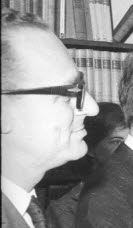
Michael Gielen
Michael Andreas Gielen (20 July 1927 – 8 March 2019) was an Austrian conductor and composer known for promoting contemporary music in opera and concert. Principally active in Europe, his performances are characterized by precision and vivacity, aiding his ability to interpret the complex contemporary music he specialized in.
For the New Zealand bishop, see Michael Gielen (bishop).
Michael Gielen
8 March 2019 (aged 91)
- Conductor
- Composer
He first worked in Buenos Aires, where he lived with his family between 1938 and 1950. In Europe, he first worked in Vienna and then in Sweden as the Generalmusikdirektor (GMD) of the Royal Swedish Opera. He conducted notable world premieres such as György Ligeti's Requièm, Karlheinz Stockhausen's Carré, and Bernd Alois Zimmermann's opera Die Soldaten and his Requiem für einen jungen Dichter. He directed the Oper Frankfurt from 1977 to 1987, installing more contemporary operas, winning stage directors such as Hans Neuenfels and Ruth Berghaus, and reviving operas such as Schreker's Die Gezeichneten. During his era, the company became one of the leading operas.
Gielen was also principal conductor of the National Orchestra of Belgium (1969–1973), the Cincinnati Symphony Orchestra (1980–1986) and the Southwest German Radio Symphony Orchestra (1986–1999). As a composer, he worked in the tradition of the Second Viennese School, often setting modern literature to music. His works were premiered with performers such as Joan Carroll, Siegfried Palm, Aloys Kontarsky and the LaSalle Quartet.
Early years[edit]
Gielen was born in Dresden to Rose (née Steuermann) and Josef Gielen.[1] His father was a theatre and opera director from 1924 at the Staatstheater Dresden, who staged the premiere of Kaiser/Weill's Der Protagonist at the Semperoper in 1926. His mother Rose came from a Jewish family in Sambor (then Austria-Hungary, now Ukraine). She was an actress who had given up acting when their first child Carola was born, but appeared occasionally, for example as a speaker in the premiere of Arnold Schönberg's Pierrot lunaire in Dresden in 1919, rehearsed with her brother Eduard Steuermann.[1][2][3] The footballplayer Zygmunt Steuermann was their younger brother.[4] The boy Michael first attended a reformed school from 1934 until it was closed by the Nazis. Both children were baptized and raised Catholic to counter Nazi indoctrination.[1]
Clemens Krauss called Josef Gielen to the Staatsoper Berlin in 1936, where Michael attended primary school for a year, and then the Kaiserin-Augusta-Gymnasium.[1] When his father's contract was dissolved in 1937,[1] he found a position at the Vienna Burgtheater. The family followed there in 1938.[1] Michael attended a grammar school and took piano lessons. Josef Gielen successfully staged at the Teatro Colón in Buenos Aires, Argentina, in 1938 and 1939, and managed to get immigration papers for his wife and the two children. In 1940, the family left for Argentina, leaving most of their belongings behind.[1]
Recordings[edit]
With the SWR, Gielen recorded various symphonies, including a complete cycle of both Mahler and Beethoven,[18][19] as well as select ones by Brahms.[18] Recordings of later composers include works by Bruckner, Stravinsky,[19] Schoenberg, Berg and Webern; his recording of Moses und Aron is its first commercial stereo recording.[18] Among the many works by modern and contemporary composers he recorded were those by Kagel, Ligeti, Nono, Zimmermann and Rihm.[18]
His recordings—and conducting in general—are noted for their relentless precision, exactness and veracity over sentimentality. These characteristics were particularly helpful in performing complex contemporary works.[18][19]
Gielen began to compose in 1946, and kept composing throughout his career as a conductor.[5] He was influenced by the tradition of the Second Viennese School, and his small oeuvre includes settings of poems by Hans Arp, Paul Claudel, Stefan George, and Pablo Neruda.[1] His die glocken sind auf falscher spur after Hans Arp was premiered in 1970 with soprano Joan Carroll, cellist Siegfried Palm, pianist Aloys Kontarsky, Wilhelm Bruck, Christoph Caskel and the composer at the Saarländischer Rundfunk festival, "Musik im 20.Jahrhundert"[20][1] His string quartet Un vieux souvenir after Baudelaire's Les Fleurs du mal, composed from 1983, was premiered in 1985 in Cincinnati by the LaSalle Quartet.[1]
His compositions are listed by the Akademie der Künste:[21]